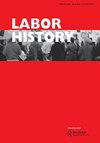“我们历史上最困难的时期”:道格拉斯·弗雷泽的总统任期和全美汽车工人联合会的衰落。
IF 0.7
4区 管理学
Q1 HISTORY
引用次数: 0
摘要
摘要本文探讨了美国最大的工业联盟汽车工人联合会(United Automobile Workers)主席道格拉斯·弗雷泽(Douglas Fraser)在1977年至83年间的工作经历。与长期任职的领导人沃尔特·鲁瑟不同,弗雷泽很少受到学术界的关注,但他在一个决定性的时刻领导着工会。1979年至1983年间,该行业经历了严重的经济衰退,为长期衰退奠定了基础。到1982年,超过三分之一的美国汽车工人失业。这些年来,工会还批准了第一份包含特许权的合同,总共放弃了40亿美元。在接下来的几十年里,回馈是普遍的。这篇文章认为,弗雷泽时代对美国汽车工人联合会和美国工人来说都是至关重要的时代,他们1980年后的经历是由工会密度下降和经济不安全加剧所决定的。第一个使用弗雷泽总统任期详细档案记录的账户,包括个人信件、美国汽车工人联合会执行委员会会议记录和工会间档案,揭示了工会在六个决定性的年份里的命运是如何发生巨大变化的。在许多方面,这些年代表了一个转折点,跨越了谈判收益的时代——发生在Reuther和Fraser的领导下——直到20世纪80年代初的让步和裁员。弗雷泽总结道,这是“我们历史上最麻烦的时刻。”本文章由计算机程序翻译,如有差异,请以英文原文为准。
‘“The most troubled time in our history”: the presidency of Douglas Fraser and the decline of the UAW.’
ABSTRACT This article explores the presidency of Douglas Fraser, who led the United Automobile Workers, America’s largest industrial union, from 1977–83. Unlike long-serving leader Walter Reuther, Fraser has received little scholarly attention, yet he headed the union at a decisive time. Between 1979 and 1983, the industry experienced a severe economic downturn, setting the stage for long-term decline. By 1982, over one-third of U.S. autoworkers were jobless. In these years, the union also approved its first contracts containing concessions, giving up $4 billion overall. In following decades, givebacks were common. This article argues that the Fraser era was a crucial one, for both the UAW and American workers broadly, whose post-1980 experience was framed by declining union density and increased economic insecurity. The first account to use detailed archival records of Fraser's presidency, including personal correspondence, UAW executive board minutes, and inter-union files, it uncovers how the union’s fortunes changed dramatically during six decisive years. In many respects these years represented a turning point, straddling the era of bargaining gains – which occurred under Reuther and initially under Fraser – through to the concessions and layoffs of the early 1980s. This was, Fraser concluded, “the most troubled time in our history.”
求助全文
通过发布文献求助,成功后即可免费获取论文全文。
去求助
来源期刊

Labor History
Multiple-
CiteScore
1.00
自引率
28.60%
发文量
44
期刊介绍:
Labor History is the pre-eminent journal for historical scholarship on labor. It is thoroughly ecumenical in its approach and showcases the work of labor historians, industrial relations scholars, labor economists, political scientists, sociologists, social movement theorists, business scholars and all others who write about labor issues. Labor History is also committed to geographical and chronological breadth. It publishes work on labor in the US and all other areas of the world. It is concerned with questions of labor in every time period, from the eighteenth century to contemporary events. Labor History provides a forum for all labor scholars, thus helping to bind together a large but fragmented area of study. By embracing all disciplines, time frames and locales, Labor History is the flagship journal of the entire field. All research articles published in the journal have undergone rigorous peer review, based on initial editor screening and refereeing by at least two anonymous referees.
 求助内容:
求助内容: 应助结果提醒方式:
应助结果提醒方式:


